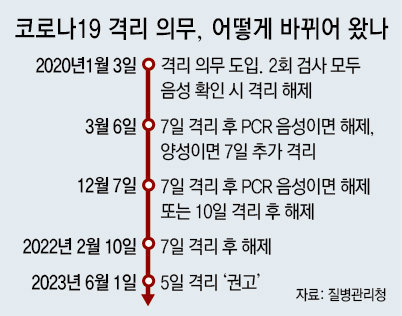‘COVID-19 crisis is over,’ government says
‘COVID-19 crisis is over,’ government says
Posted May. 12, 2023 07:51,
Updated May. 12, 2023 07:51

At the latest, no later than June 1, mandatory quarantine for confirmed COVID-19 patients will be lifted. On Thursday, President Yoon Suk Yeol announced that COVID-19 Crisis Alert Level (CAL) has been adjusted from ‘Level 4 Serious’ to ‘Level 3 Warning.' This effectively led to the declaration of COVID-19 endemic.
On this day, President Yoon held a meeting of the Central Disaster and Safety Countermeasure Headquarters and announced that “the mandatory 7-day quarantine for confirmed cases will be converted to a ‘five day recommended.’” This is an endemic declaration that COVID-19 is now managed in daily life, like endemic diseases such as influenza (flu). President Yoon said, “I am glad that citizens are returning to their daily lives after three years and four months. I am grateful to the medical staff who devoted themselves to returning to daily life after experiencing a prolonged pandemic.” Twelve medical staff, including doctors, nurses, and nursing assistants, were invited to the meeting. It was reported that President Yoon gave them two rounds of applause and sent them off to the front door after the meeting.
The Korea Disease Control and Prevention Agency (KDCA) set the time point for lowering the Crisis Alert Level to June 1, taking into account the time it takes to revise notifications. However, it was announced that quarantine mitigation would be implemented from the end of this month, earlier than June 1. “I think it can be seen as the beginning of an endemic disease,” said KDCA chief Ji Young-mi.
Accordingly, the number of confirmed cases will be announced weekly instead of daily, and gene amplification (PCR) tests will not be conducted after entry. Mandatory mask-wearing will also be lifted everywhere except hospitals with inpatient rooms and nursing homes for the elderly. In order to establish a culture of taking a day off when sick, the attendance of confirmed students who voluntarily isolate themselves at home will be acknowledged, and the use of sick leave or telecommuting at work will be encouraged. Non-face-to-face treatment, which was fully permitted during the pandemic, was converted into a pilot project, limiting non-face-to-face treatment for first-time patients.
KDCA also announced a mid-to-long-term plan to prepare for the pandemic of new infectious diseases, considering that the cycle of new infectious diseases is shortening and the scale of damage is increasing. In the future, if another pandemic occurs, the localization of messenger ribonucleic acid (mRNA) vaccine technology will be promoted to secure vaccines and treatments within 100 days. KDCA has decided to secure beds to respond to a pandemic with 1 million confirmed cases per day and establish an early warning system through international cooperation.
Kyu-Jin Shin newjin@donga.com



![[단독]이혜훈 “장남 다자녀로 연대 입학”…당시 그런 전형 없었다](https://dimg.donga.com/c/138/175/90/1/wps/NEWS/IMAGE/2026/01/23/133215083.1.jpg)
![하버드 의사가 실천하는 ‘뇌 노화 늦추는 6가지 습관’ [노화설계]](https://dimg.donga.com/c/138/175/90/1/wps/NEWS/IMAGE/2026/01/22/133210626.3.jpg)


